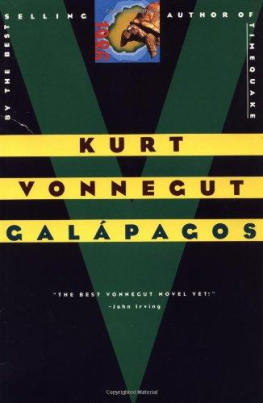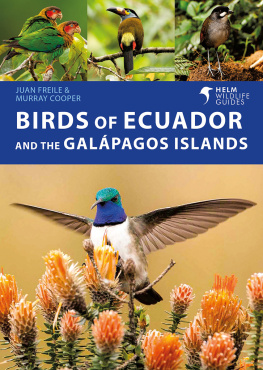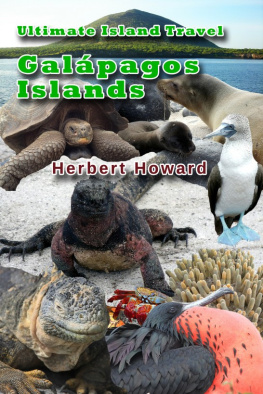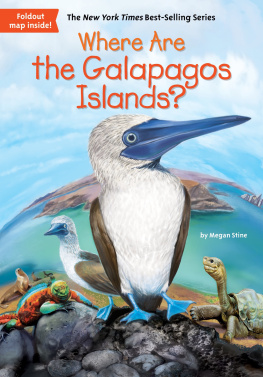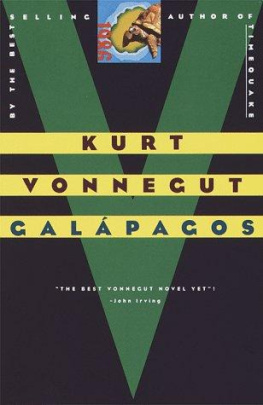Galaagos: a novel
Book Jacket
SUMMARY:Galapagostakes the reader back one million years, to A.D. 1986. A simple vacation cruise suddenly becomes an evolutionary journey. Thanks to an apocalypse, a small group of survivors stranded on the Galapagos Islands are about to become the progenitors of a brave new, and totally different human race. Here, America's master satirist looks at our world and shows us all that is sadly, madly awry -- and all that is worth saving.
GALAPAGOS by Kurt Vonnegut
A LAUREL BOOK
Published by
Dell Publishing a division of
Bantam Doubleday Dell Publishing Group, Inc.
1540 Broadway
New York, New York 10036
If you purchased this book without a cover you should be aware that this book is stolen property. It was reported as "unsold and destroyed" to the publisher and neither the author nor the publisher has received any payment for this "stripped book."
A signed first edition of this book has been privately printed by The Franklin Library
Cover design: Carin Goldberg
Cover illustration: Gene Greif
Copyright (c) 1985 by Kurt Vonnegut
All rights reserved. No part of this book may be reproduced or transmitted in any form or by any means, electronic or mechanical, including photocopying, recording, or by any information storage and retrieval system, without the written permission of the Publisher, except where permitted by law. For information address: Delacorte Press/Seymour Lawrence, New York, New York.
The trademark Laurel is registered in the U.S. Patent and Trademark Office and in other countries.
The trademark Dell is registered in the U.S. Patent and Trademark Office.
ISBN: 0-440-12779-3
Reprinted by arrangement with Delacorte Press/Seymour Lawrence
Printed in the United States of America
Published simultaneously in Canada
August 1988
OPM 21 20 19 18 17 16 15 14 13
_In memory of Hillis L. Howie,_
_(1903-1982) amateur naturalist --_
_A good man who_
_took me and my best friend Ben Hitz_
_and some other boys_
_out to the American Wild West_
_from Indianapolis, Indiana,_
_in the summer of 1938._
_Mr. Howie introduced us to real Indians_
_and had us sleep out of doors every night_
_and bury our dung,_
_and he taught us how to ride horses,_
_and he told us the names of many plants_
_and animals,_
_and what they needed to do_
_in order to stay alive_
_and reproduce themselves._
_One night Mr. Howie scared us half to death_
_on purpose,_
_screaming like a wildcat near our camp._
_A real wildcat screamed back._
In spite of everything, I still believe people
are really good at heart.
_ -- Anne Frank (1929-1944)_
--------------
BOOK ONE
_The Thing Was_
--------------
The thing was:
One million years ago, back in 1986 A.D., Guayaquil was the chief seaport of the little South American democracy of Ecuador, whose capital was Quito, high in the Andes Mountains. Guayaquil was two degrees south of the equator, the imaginary bellyband of the planet after which the country itself was named. It was always very hot there, and humid, too, for the city was built in the doldrums -- on a springy marsh through which the mingled waters of several rivers draining the mountains flowed.
This seaport was several kilometers from the open sea. Rafts of vegetable matter often clogged the soupy waters, engulfing pilings and anchor lines.
o
Human beings had much bigger brains back then than they do today, and so they could be beguiled by mysteries. One such mystery in 1986 was how so many creatures which could not swim great distances had reached the Galgos Islands, an archipelago of volcanic peaks due west of Guayaquil -- separated from the mainland by one thousand kilometers of very deep water, very cold water fresh from the Antarctic. When human beings discovered those islands, there were already geckos and iguanas and rice rats and lava lizards and spiders and ants and beetles and grasshoppers and mites and ticks in residence, not to mention enormous land tortoises.
What form of transportation had they used?
Many people were able to satisfy their big brains with this answer: They came on natural rafts.
o
Other people argued that such rafts became waterlogged and rotted to pieces so quickly that nobody had ever seen one out of sight of land, and that the current between the islands and the mainland would carry any such rustic vessel northward rather than westward.
Or they asserted that all those landlubberly creatures had walked dry-shod across a natural bridge or had swum short distances between stepping-stones, and that one such formation or another had since disappeared beneath the waves. But scientists using their big brains and cunning instruments had by 1986 made maps of the ocean floor. There wasn't a trace, they said, of an intervening land mass of any kind.
o
Other people back in that era of big brains and fancy thinking asserted that the islands had once been part of the mainland, and had been split off by some stupendous catastrophe.
But the islands didn't look as though they had been split off from anything. They were clearly young volcanoes, which had been vomited up right where they were. Many of them were such newborns out there that they could be expected to blow again at any time. Back in 1986, they hadn't even sprouted much coral yet, and so were without blue lagoons and white beaches, amenities many human beings used to regard as foretastes of an ideal afterlife.
A million years later, they do possess white beaches and blue lagoons. But when this story begins, they were still ugly humps and domes and cones and spires of lava, brittle and abrasive, whose cracks and pits and bowls and valleys brimmed over not with rich topsoil or sweet water, but with the finest, driest volcanic ash.
o
Another theory back then was that God Almighty had created all those creatures where the explorers found them, so they had had no need for transportation.
o
Another theory was that they had been shooed ashore there two by two -- down the gangplank of Noah's ark.
If there really was a Noah's ark, and there may have been -- I might entitle my story "A Second Noah's Ark."
There was no mystery a million years ago as to how a thirty-five-year-old American male named James Wait, who could not swim a stroke, intended to get from the South American continent to the Galgos Islands. He certainly wasn't going to squat on a natural raft of vegetable matter and hope for the best. He had just bought a ticket at his hotel in downtown Guayaquil for a two-week cruise on what was to be the maiden voyage of a new passenger ship called the _Bahde Darwin_, Spanish for "Darwin Bay." This first Galgos trip for the ship, which flew the Ecuadorian flag, had been publicized and advertised all over the world during the past year as "the Nature Cruise of the Century."
Wait was traveling alone. He was prematurely bald and he was pudgy, and his color was bad, like the crust on a pie in a cheap cafeteria, and he was bespectacled, so that he might plausibly claim to be in his fifties, in case he saw some advantage in making such a claim. He wished to seem harmless and shy.
He was the only customer now in the cocktail lounge of the Hotel El Dorado, on the broad Calle Diez de Agosto, where he had taken a room. And the bartender, a twenty-year-old descendent of proud Inca noblemen, named Jestiz, got the feeling that this drab and friendless man, who claimed to be a Canadian, had had his spirit broken by some terrible injustice or tragedy. Wait wanted everybody who saw him to feel that way.

